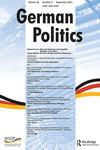Torn between Two Lovers: German Policy on Economic and Monetary Union, the New Hanseatic League and Franco-German Bilateralism
IF 2.1
3区 社会学
Q2 POLITICAL SCIENCE
引用次数: 5
Abstract
German governments and European Union (EU) member states forming the New Hanseatic League (HL) have had very similar preferences on EU / Eurozone financial support mechanisms. We would expect German and HL governments to be close allies on these matters. However, empirically, we detect differences. German governments have repeatedly resisted participating in HL joint positions on EU financial support mechanisms and accepted compromises with France. In order to explain this divergence we consider the relative explanatory merit of economic preferences, based on both material interests and economic ideas—here ordoliberalism—on the one hand, and norms of cooperation—here Franco-German ‘embedded bilateralism’—and geo-strategic interests on the other hand. We disentangle economic preference formation and the choice in favour of a political strategy to pursue these preferences. Economic preferences are one factor explaining the extent of concessions made by Germany to the HL countries and France. However, norms of cooperation and geostrategic interests explain the choice of German governments on how and with whom best to pursue their preferences. German governments have performed a balancing act between the HL and France, skewed towards the latter. The presence of economic crises increases the degree to which this balancing act is skewed towards France.两个恋人之间的纠结:德国的经济货币联盟政策、新汉萨同盟与法德双边主义
德国政府和组成新汉萨同盟的欧盟成员国在欧盟/欧元区金融支持机制方面有着非常相似的偏好。我们期望德国和HL政府在这些问题上成为亲密盟友。然而,根据经验,我们发现了差异。德国政府一再拒绝参与HL关于欧盟财政支持机制的联合立场,并接受与法国的妥协。为了解释这种分歧,我们考虑了经济偏好的相对解释价值,一方面基于物质利益和经济思想——这里是秩序自由主义,另一方面基于合作规范——这里是法德“嵌入式双边主义”——以及地缘战略利益。我们将经济偏好的形成与追求这些偏好的政治战略的选择混为一谈。经济优惠是解释德国对HL国家和法国做出让步程度的一个因素。然而,合作规范和地缘战略利益解释了德国政府如何以及与谁一起最好地追求自己的偏好。德国政府在HL和法国之间采取了平衡行动,倾向于后者。经济危机的存在增加了这种平衡行为向法国倾斜的程度。
本文章由计算机程序翻译,如有差异,请以英文原文为准。
求助全文
约1分钟内获得全文
求助全文

 求助内容:
求助内容: 应助结果提醒方式:
应助结果提醒方式:


